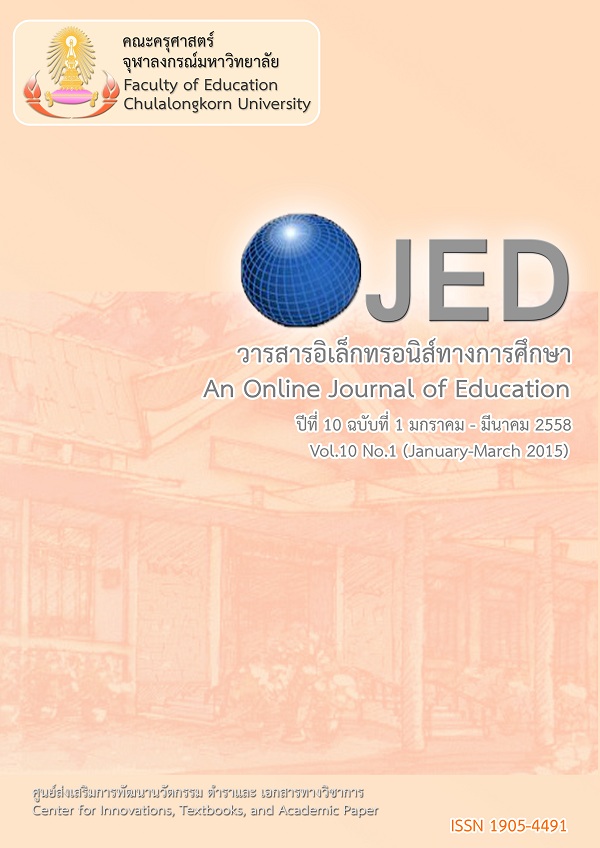มุมมองของครูผู้สอนภาษาอังกฤษในฐานะภาษาต่างประเทศต่อการใช้แผนผังความคิด ในการสอนไวยากรณ์
Keywords:
มุมมองของครูผู้สอนภาษาอังกฤษในฐานะภาษาต่างประเทศ/ แผนผังความคิด/ การสอนไวยากรณ์/EFL TEACHERS’ PERSPECTIVES/ MIND MAPPING TECHNIQUE/ GRAMMAR INSTRUCTIONAbstract
การวิจัยนี้มีจุดประสงค์เพื่อ 1) ศึกษามุมมองทั่วไปของครูผู้สอนภาษาอังกฤษในฐานะภาษาต่างประเทศต่อการใช้แผนผังความคิดในการสอนไวยากรณ์ และ 2) ศึกษาอุปสรรคของการใช้แผนผังความคิดในการสอนไวยากรณ์ กลุ่มตัวอย่างของงานวิจัยนี้คือครูผู้สอนภาษาอังกฤษในฐานะภาษาต่างประเทศจำนวน 50 คน จากโรงเรียนมัธยมศึกษาสองแห่งในจังหวัดเพชรบูรณ์ซึ่งถูกเลือกโดยการสุ่มตัวอย่างแบบง่าย เครื่องมือที่ใช้ในการวิจัย ได้แก่ แบบสอบถามและแบบสัมภาษณ์ การวิเคราะห์ข้อมูลเชิงปริมาณ ใช้สถิติเชิงพรรณนา ความถี่ การทดสอบค่าที และการวิเคราะห์ความแปรปรวนแบบทางเดียว การวิเคราะห์ข้อมูลเชิงคุณภาพนั้นใช้การวิเคราะห์เนื้อหา ผลการวิจัยพบว่าครูผู้สอนภาษาอังกฤษในฐานะภาษาต่างประเทศส่วนใหญ่ใช้แผนผังความคิดในการสอนไวยากรณ์ และยอมรับว่าเป็นเครื่องมือที่มีประโยชน์และมีประสิทธิภาพต่อการสอนไวยากรณ์ ครูส่วนใหญ่มีความตั้งใจที่จะใช้แผนผังความคิดในตอนท้ายของบทเรียนเพื่อให้นักเรียนได้รับรู้และจดจำไวยากรณ์ภาษาอังกฤษ การจัดการเรียนรู้แบบร่วมมือทำให้ผู้เรียนสามารถสร้างแผนผังความคิดได้อย่างมีประสิทธิภาพ อุปสรรคที่เกิดขึ้นในขณะใช้แผนผังความคิดประกอบด้วย การขาดประสบการณ์ในการใช้แผนผังความคิดในการสอน และการสิ้นเปลืองเวลาเมื่อมีการสอนผ่านแผนผังความคิด ครูมีความเห็นว่าขั้นตอนการวางแผนและการสร้างรายละเอียดบนแผนผังความคิดเป็นขั้นตอนที่ยากที่สุด นอกจากนี้ ความคิดเห็นของครูเพศหญิงและเพศชายนั้นไม่มีความแตกต่างกัน แต่ในกรณีของครูที่มีประสบการณ์การสอนต่างกัน พบว่าครูมีความคิดเห็นต่อความเชื่อและความตั้งใจในการสอนไวยากรณ์ผ่านแผนผังความคิดที่แตกต่างกันอย่างมีนัยสำคัญทางสถิติที่ระดับ .05
The study aimed to 1) to investigate EFL teachers’ general perspectives toward using mind mapping technique in grammar instruction and 2) to examine the difficulties of using mind mapping technique in grammar instruction. The participants of the study were 50 EFL teachers at two secondary schools in Phetchabun province selected through the simple random sampling technique. The instruments for this study were a questionnaire and a semi-structured interview. The quantitative data was analyzed using descriptive statistics, frequency, t-test and One-way ANOVA. The qualitative data obtained from the semi-structured interviews was analyzed using content analysis. The results showed that the majority of EFL teachers used mind mapping technique in grammar instruction and they acknowledged that it was useful and effective tools in teaching grammar. Most of them intended to use this technique at the end of the lesson to help students visualize and remember English grammar. Cooperative learning was a strategy to foster students to create mind maps effectively. The difficulties during using mind maps were composed of lack of experiences in applying mind mapping in the instruction and time-consumption when teaching through mind mapping. The most difficult aspect was planning and making details on mind maps. Besides, there was no difference in teachers’ perspectives between different genders, but in case of beliefs and intention in teaching grammar through mind mapping among teachers’ different years of teaching English were different at the significant level of .05.




